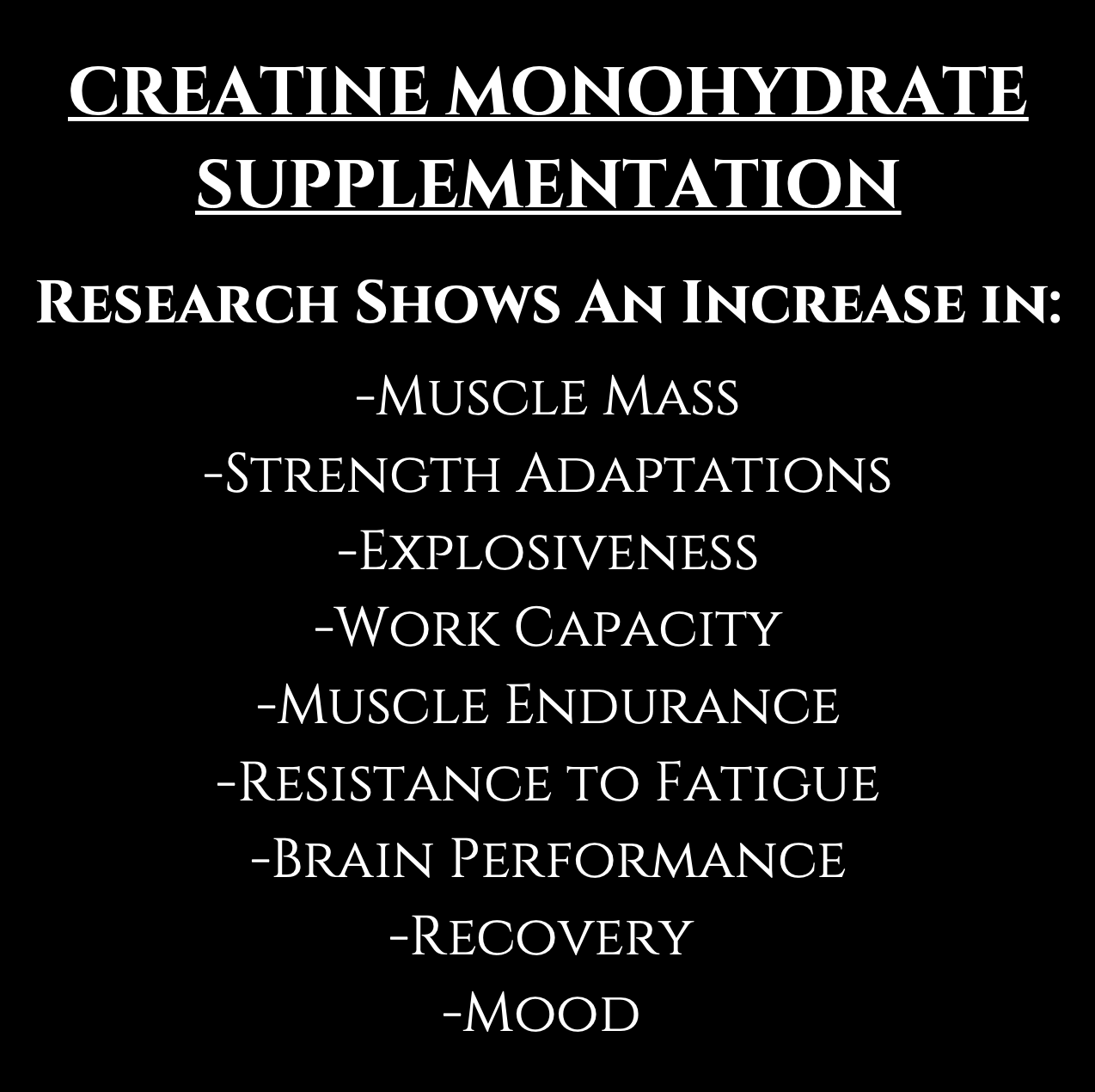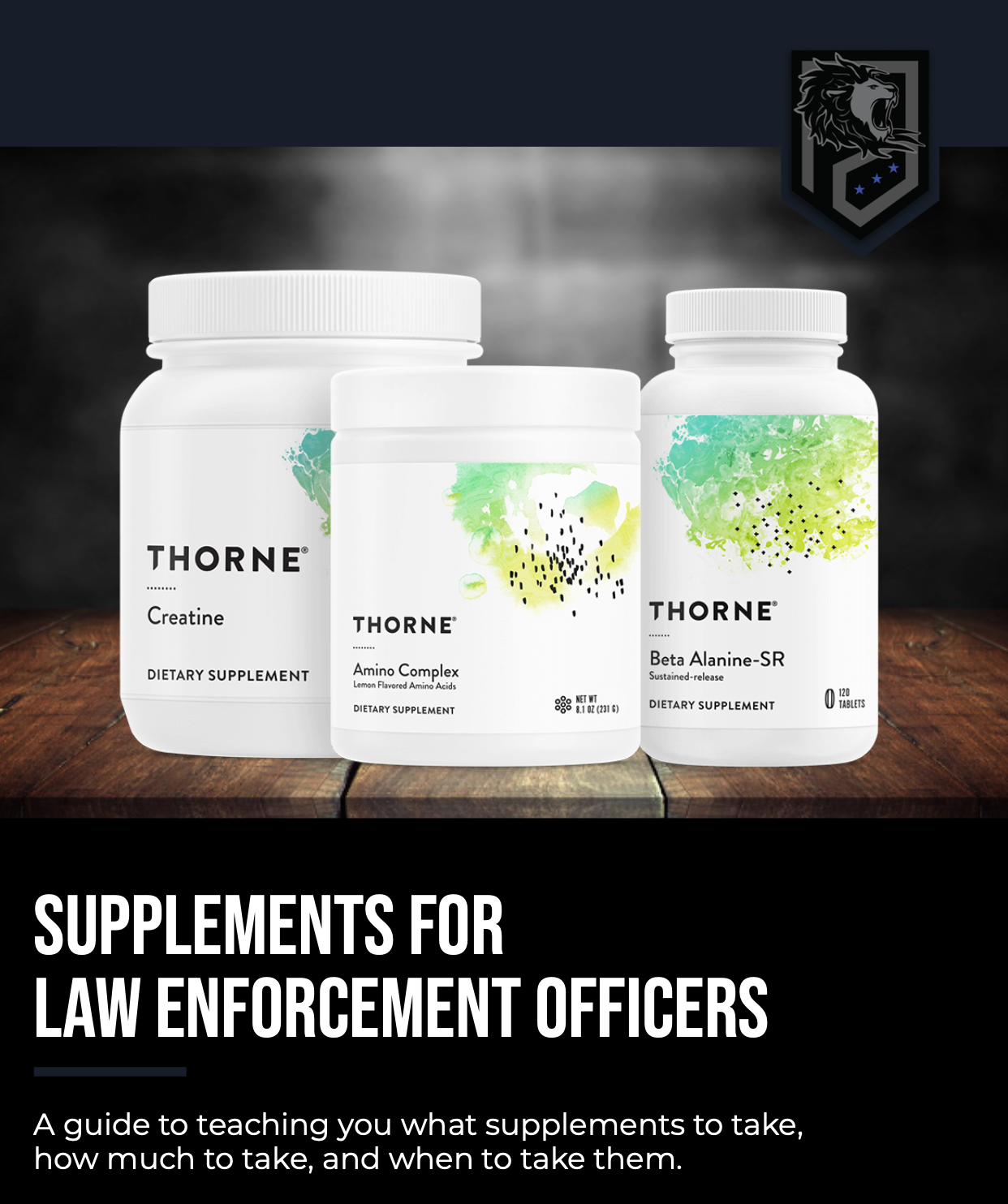Top 3 Performance Supplements for LEOs
Apr 17, 2022
We would like to preface this article with the definition of a supplement from Oxford Languages:
Sup·ple·ment
noun
/ˈsəpləmənt/
1. something that completes or enhances something else when added to it.
Ok, now that we got that off our chests…
Please remember that supplements are not magic. They are meant to be supplemental to a solid diet/nutrition protocol, 7 to 9 hours of quality sleep per night, a solid stress management system, good relationships with people, a fulfilling career, among other things that build well-rounded physical and mental health.
The point is this: If you are lacking any of the above, that are the true basis of healthy living, supplements will not be the solution to your problem. Master these things first, then take additional supplements, if you wish!
Below we will give a detailed breakdown of 3 supplements that are backed by scientific research and years of successful use! Each will have 3 categories: What, Why, and How Much?
#1) WHEY PROTEIN POWDER

What?
Protein powders can come in many varieties: whey, casein, egg white, vegan varieties (pea is very common), and more. This may be a bit overwhelming to some, which is completely understandable.
If that wasn’t enough choices for you, they can also come in different forms such as concentrates, isolates, and hydrolysates.
We at EFT prefer using whey protein powder simply due to the extensive research available. Isolates can be the preferred version if you are sensitive to lactose, as it is a higher concentration of protein with less of the carbohydrate and fats that you’ll find in regular whey concentrate. Both options are excellent!
Whey, specifically, is a tried and true supplement. Whey is derived from milk and is actually a byproduct of the cheese making process! This version is fast-digesting and high in branched-chain amino acids, which quickly gets muscle protein synthesis to work, leading to enhanced recovery and lean muscle building!
Why?
As stated in our recent blog Simplifying Macros For LEOs, protein is an essential macronutrient that plays plenty of roles in body processes. See that article for a deep dive into what protein does for the body!
Protein is also required for reaching pretty much any training/health goal that you have, whether it be weight loss, lean muscle mass building, strength gains, changing your body composition, overall health, longevity, etc.
Adequate protein consumption can also aid in a speedier recovery time from training session to training session. This is huge, especially as an LEO, since many of us are lacking sleep and probably have higher stress levels than many people.
How Much?
A general rule of thumb for daily protein goal is consuming your bodyweight in pounds in grams of protein.
Ex: If you weigh 195lbs (pounds), your daily target for protein is 195g (grams).
Since we are talking about protein powder supplements, we are obviously not looking to get all of our daily protein intake here! The majority of our protein consumption should be met with whole, minimally processed foods.
With that being said, 1-2 scoops of protein powder per day (this typically equals somewhere between 25-50g of protein) is a healthy, safe, and effective use of the supplement.
Download Our Supplement Guide for Cops 2.0
#2) CREATINE MONOHYDRATE

What?
Creatine is a compound found in the body; specifically the muscles, brain, and other organs. It is produced from amino acids mostly in the liver and plays an important role in energy production that is used for physical and mental activities, especially ones that are very energy-demanding!
Meat (red meat) and fish are great sources of creatine from our diet, but endless research has shown that creatine monohydrate supplementation is, in fact, safe and extremely effective.
Why?
In the strength & conditioning world, this is important because it improves energy supply to muscle tissues - this allows us to perform better in the gym, in life, and particularly in scenarios we face on the job as an LEO.
On top of improving physical performance, creatine supplementation may have an impact on brain performance, decision making, and may even reduce symptoms of depression. This research is a bit less clear, but nonetheless, it may be worth taking since there is a possibility that it may improve mental performance.
Take a look at what the data shows:

How Much?
Very straightforward from the extensive research done on this supplement:
3-5 grams per day. Every day. Whether training or not.
There was once the suggestion that a loading dose is needed - this would be where you take 3-5x the recommended dose for the first week, but this has been proven to not be necessary. Also, there can be some serious gastrointestinal discomfort (especially without adequate water intake) so we do not recommend doing it that way.
Simply, one 3-5g scoop per day, every day, and you will be good to go (“fully saturated”) within a couple weeks.
There may be additional benefits if you take your daily dose POST-workout with some carbohydrates, but it is not mandatory to do it that way.
If you experience an upset stomach, diarrhea, etc… you may want to consider drinking more water! If that doesn’t do the trick, half the dose for a few weeks then slowly increase back to the suggested dosage of 3-5g.
Download Our Supplement Guide for Cops 2.0
#3) CAFFEINE
What?
Caffeine is a stimulant that comes from coffee beans that has been used for hundreds upon thousands of years!
You can find natural caffeine in all types of coffee and teas.
Notice the word… “natural.”
Caffeine can also be synthetically produced in labs, which is commonly used nowadays in energy drinks, pre-workouts, pills/capsules, and soda.
How does it work? Well, we build up more and more fatigue as the day goes on. This happens naturally just going about our daily lives, training, working, dealing with stressful situations, or if we are chronically lacking sleep, etc. The more fatigued we are, the more adenosine builds up in our system. This is a good thing and it is absolutely necessary, because adenosine is what tells our brain and our body to calm down, relax, and that we need sleep.
Caffeine suppresses this adenosine, leading us to believe that we are not as in need of rest as we actually are!
This can be a very good thing, but it could also be abused and have detrimental effects that will be discussed later in this article.
Why?
Caffeine is very well-known as a performance enhancer.
It has also been classified as a nootropic (improving cognitive function) and an ergogenic (supporting fat loss). It has been proven time and time again to enhance physical performance, including strength and endurance.
Caffeine can increase alertness and focus and keep you awake, in turn increasing productivity.
It has also been associated with reducing the risk of some diseases such as Alzheimers and Cancer.
How Much?
The amount of caffeine desired, preferred, and actually needed for performance enhancement varies per individual.
5-6mg of caffeine per kilogram of body weight has been frequently studied, but as low as 2mg/kg body weight has been shown to improve physical performance.
Some people may be much more sensitive to caffeine and may do well with as little as 50-100mg per day, which could simply be one cup of coffee.
Others, who also may have developed a tolerance to caffeine, may do better with 200-300mg, and maybe even up to 400mg. This could be more than one cup of coffee, a shot or double shot of espresso, or higher caffeinated tea such as black tea.
There is a point of diminishing returns though, that we must be aware of. Too much caffeine can have unpleasant side effects such as: GI distress, headaches, dizziness, higher heart rate, increased anxiety, poor sleep quality and quantity, and more.
Source: https://www.ncbi.nlm.nih.gov/pmc/articles/PMC7231502/


